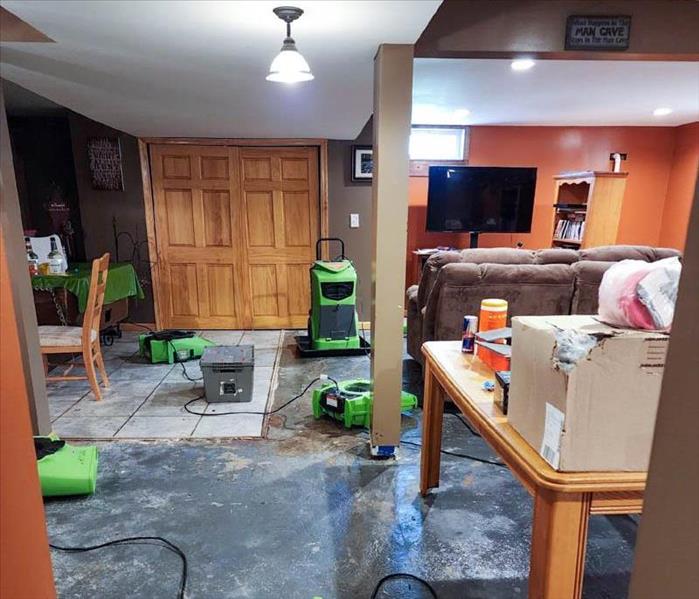Archived Water Damage Blog Posts
How Properly Recording Water Damage Can Make or Break Your Insurance Claim
10/21/2023 (Permalink)
 When faced with water damage in your home or property, documenting the extent of the damage is a critical step in the recovery process.
When faced with water damage in your home or property, documenting the extent of the damage is a critical step in the recovery process.
When faced with water damage in your home or property, documenting the extent of the damage becomes a critical step in the recovery process. Not only does thorough documentation help in assessing the necessary repairs and restoration, but it is also crucial for filing an insurance claim. In this blog post, we will explore the importance of documenting water damage and provide essential tips for maximizing your chances of a successful insurance claim.
Why Documentation Matters
Evidence for insurance claims: Proper documentation serves as evidence when filing an insurance claim for water damage. It helps establish the date, cause, and extent of the damage, supporting your claim for coverage and reimbursement.
Accurate assessment of damages: Detailed documentation allows for an accurate assessment of the damages. This ensures that all necessary repairs and restoration work are included in the insurance claim, avoiding potential disputes or underestimations that may leave you out of pocket for additional expenses.
Proof of pre-existing conditions: Documentation can also be vital in proving that certain damages existed before the water incident occurred. This prevents insurance companies from denying claims based on pre-existing conditions or wear and tear, which may not be covered.
Tips for Documenting Water Damage
Take photographs and videos: Capture comprehensive visual evidence of the damage using a camera or smartphone. Take photos and videos from multiple angles to provide a clear view of the affected areas. Remember to date your documentation to establish when the damage occurred.
Note relevant details: Record important details related to the water damage, such as the cause of the incident, areas affected, and any visible signs of damage or deterioration. Include descriptions of any valuable items or personal belongings that have been affected, as well.
Preserve documentation: Store all documentation, including photos, videos, receipts for repairs, and communications with contractors or restoration professionals in a safe place. This ensures that you have access to all the necessary information when filing an insurance claim.
Seek professional assessments: Engage professionals, such as water damage restoration experts, to assess the extent of the damage and provide detailed reports. These professional assessments often carry more weight in insurance claims and can help substantiate the severity of the damages.
Contact the insurance company promptly: Notify your insurance company as soon as possible after the water damage event. Follow their guidance regarding the claims process and provide all the necessary documentation and evidence promptly to avoid any delays or complications.
Remember, thorough documentation is the key to successfully navigating the insurance claims process after water damage. By capturing and preserving accurate and detailed evidence, you can ensure a smoother experience and maximize your chances of receiving the coverage you deserve to restore your property back to its pre-damage condition.
Is Homeowners Insurance Coverage for Burst Pipes?
11/8/2022 (Permalink)
 It's important to know if your homeowners’ insurance will cover the damage.
It's important to know if your homeowners’ insurance will cover the damage.
Homeowners Insurance and Burst Pipes
When it comes to frozen and burst pipes, you want to know that your home insurance policy will protect you from costly damage. However, not all policies cover the same things. To help you navigate what is and isn't included in your plan, we've put together this guide.
Frozen and Burst Pipe Insurance Coverage
In the winter, frozen and burst pipes can occur. If you have a pipe that bursts, it's important to know if your homeowners’ insurance will cover the damage. In many cases, it does—but it's not always clear what exactly qualifies as a "burst" pipe. Many people assume their homeowners’ policy should cover this type of damage but aren't sure what kinds of pipes are covered or whether there are any limitations on how much coverage they'll receive.
Preventing a Frozen Pipe
As with all things related to your home and belongings, prevention is key when preventing frozen pipes—and there are some simple steps you can take:
- Make sure that all exterior faucets are turned off during freezing temperatures so they don't freeze up (or use anti-freeze products).
- Be sure to check outdoor spigots regularly during cold weather months; never leave them unattended while in use!
- Also, keep outdoor spigots cleaner than indoor ones so they don’t clog up from dirt buildup over time (which also causes blockages).
- Insulate any exposed pipes in crawl spaces under houses.
Water Damage Insurance Coverage
Under the Water Damage section of your policy, you will find that your insurer covers water damage from burst pipes. A burst pipe is defined as a break in any part of the pipe system that transports water to or from a building.
If a pipe breaks, causing flooding and/or damage to property within your home or building, this is considered a covered claim under this section.
Examples of covered claims include burst water pipes (including frozen) Leaking toilets, overflowing bathtubs or sinks, and damaged sump pumps.
In addition to covering damage resulting from burst pipes and leaks, your policy also provides coverage for things like sewer backups and flooding if it happens outside (for example if there’s heavy rain).
Reasons for Frozen Pipes
There are several causes of frozen pipes. The first is that the water in your home may have been turned off, which will cause the pipes to freeze and burst. This can happen if you have a leaky faucet or toilet, and you forget to fix it. Another cause could be if there's a power outage in your neighborhood, causing all appliances that use electricity—including heaters and water heaters—to stop working.
If you've experienced any of these situations, it's important to act quickly to prevent damage from occurring further down the line. If you suspect that your pipes are frozen but aren't certain whether there's been any internal damage yet, make sure they're not leaking before calling an emergency plumber out so they can assess whether or not there's any risk involved in turning them back on again (e.g., electrical hazards). It's also vital that homeowners know what kind of coverage they have before making any repairs themselves. Identifying what type of plan works best for their needs will help protect them against future expenses related to damages caused by frozen pipes during winter months when temperatures drop significantly outside.
When it comes to frozen and burst pipes, insurance companies may have different policies on what is covered by your policy. It’s important to know what is and isn't covered so that you can plan ahead for an emergency. If you aren’t sure, call your insurance company and find out.
When a pipe bursts in your home or business, give SERVPRO of Williamsport/Montoursville a call! We will be quick to mitigate the water in your home, and get your Muncy property back to normal.
Is Clog Remover a Good Idea?
4/8/2022 (Permalink)
Sometimes our drains get clogged, and we reach for the drain cleaner, but we should be cautious of that. There are certain situations in which drain cleaner should never be used to prevent more damage from occurring.
Plastic Pipes
The chemicals in drain cleaner react together to transfer electrons to and from organic substances, causing them to break down. This process also produces heat- that's how they force their way down further into the pipe. These two factors mean that they can warp or eat through softer pipes, like plastic. The three types of cleaners you should stay away from if you do have plastic pipes are:
- Sulfiric or muriatic acid cleaners
- Lye or caustic potash cleaners
- Bleach, peroxide or nitrate cleaners
Old Pipes
Old pipes will have a lot of the same problems as plastic pipes, because they are brittle and delicate. If you discover that your pipes are old or rusting, you are probably better off replacing your plumbing rather than using a clog removing agent.
Total Blockage
Often, drain cleaners won't be able to clear a clogged drain if there is a solid mass of hair, oil or debris completely blocking the flow of air and liquid. If they are used in these situations, the cleaner ends up sitting there above the clog. Given enough time the strong chemicals may cause some real damage to your pipes.
Instead of chemical cleaner, you can try vinegar/baking soda and hot water, or biological options like a drain snake.
 When faced with water damage in your home or property, documenting the extent of the damage is a critical step in the recovery process.
When faced with water damage in your home or property, documenting the extent of the damage is a critical step in the recovery process.





 24/7 Emergency Service
24/7 Emergency Service
